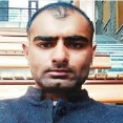
Amit Kumar Jakhar
Work place: Department of Computer Science and Engineering, Jaypee University of Information Technology, Waknaghat, Solan, H.P., India
E-mail: amitjakhar69@gmail.com
Website:
Research Interests: Software, Software Engineering, Machine Learning
Biography
Amit Kumar Jakhar is currently working as an Assistant Professor (SG) in the Department of Computer Science & Engineering at Jaypee University of Information Technology (JUIT), Waknaghat, India. Dr. Amit Kumar has five-plus years of extensive experience in Academics. Before joining Jaypee Group, he was associated with Amity University, Noida. He obtained his Ph.D. (Computer Science & Engineering, 2017) from Birla Institute of Technology, Mesra, Ranchi, India. He obtained his M. Tech. (Computer Science & Engineering, 2010) from PEC University of Technology, Chandigarh. He obtained his B. Tech. (Computer Science & Engineering, 2008) from MDU, Rohtak, Haryana. He has published his research in peer-reviewed International Journals and Conferences. His primary area of research includes software engineering, software estimation, and machine learning.
Author Articles
Driver Drowsiness Detection System
By Amit Kumar Jakhar Bhupendra Kumar Pathak Kaustubh Mishra Rajiv Kumar
DOI: https://doi.org/10.5815/ijem.2024.04.03, Pub. Date: 8 Aug. 2024
When you are driving a car and you are being responsible for your co-passenger and other innocent being on the road, you should be extra responsible. Many fatal and minor accidents happen on the road due to the drowsiness of drivers only. Hence, there is a need to detect drowsiness while driving a car. It has become an important requirement for everyone’s safety. The main objective of this study is to create a highly accurate drowsiness detection system using methods that are both affordable and easy for any car manufacturer to include in their cars. The ultimate objective is to increase road user’s protection by raising the level of safety for both drivers and their cars. This study's main contribution is the implementation of a bimodule method for drowsiness detection. The first module effectively detects signs of drowsiness by analyzing a constant stream of images of the driver in real time using a reinforcement learning model. Simultaneously, the car's second module, which is built into the steering wheel grip, keeps track of the driver's hand pressure when performing turns and emergency scenarios. The findings of the study highlight how well the proposed system works to reduce the risks associated with drowsy driving. It further highlights the value of cutting-edge technology in protecting other drivers and improving driving safety, which has the potential to save lives and avoid accidents.
[...] Read more.Other Articles
Subscribe to receive issue release notifications and newsletters from MECS Press journals